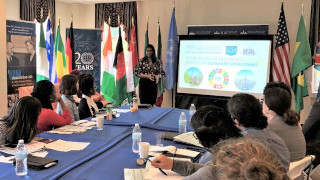Prasaadi Dangolla
M.A., Communication / M.A., Diplomacy and International Relations
Home Country, Sri Lanka

Originally from Sri Lanka, Prasaadi "Dani" Dangolla is a Seton Hall University alumna (’20) who completed her dual degree program in Communication and Diplomacy and International Relations, specializing in Global Health and Human Security. We sat down for an interview with Dani to learn more about her graduate student experiences, leading to a career in global health with one of the world’s largest pharmaceutical company, Johnson & Johnson (J&J) – where she serves as a communication specialist under the Innovation, Global Health and Science Policy Communication team.
As an international student, how did your experience differ from others?
A lot of my colleagues came from other countries and various regions. It was really
interesting to take one single policy and hear about it from so many perspectives.
It was like we were our own small UN there. Having that and being able to connect
with someone from across the world and learn about new cultures was fantastic. As
a student I have been very blessed to study at a prestigious and diverse school like
Seton Hall. As an international student, being surrounded by many other international
students was eye opening and amazing.
Did you form meaningful relationships during your graduate studies?
I absolutely, 100% created meaningful and important relationships with faculty on
campus. I think in fact that the relationships that the professors foster between
grad students was monumental for me. For instance, we would meet up, grab a bite and
brainstorm how to approach an assignment, do homework together, and interact and get
to know each other. It was such an intimate setting. It was fantastic because the
professors would encourage it all the time.
What was the entry pathway into J&J?
It all started with an internship in the summer of 2019, as part of a program requirement
at the School of Diplomacy. Most of my past jobs were positions that became converted
from internships, so I 100% believe in them. I always encourage students to get an
internship for two reasons: first, it is a great way to dip your toe into a potential
career and figure out if you like it. Secondly, it will allow you to figure out what
kind of day you want to spend. Do you want to be in calls all day, or sit at a computer,
or talk to people all day?
What does your day-to-day look like at J&J?
My daily routine involves a decent amount of writing and planning for events and strategizing.
I am going into some new projects that are centered around the idea of innovation
and science. Now, more than ever, innovation has come to the forefront of the world
especially with Covid-19 and vaccines, and vaccines are scientific innovations. At
a time like this, being in the scientific realm has been very exciting. Global health
has become a hard power with every country and state trying to accumulate as many
vaccines as possible. To be in the pharmaceutical world at a time like this has been
very exciting. How did your graduate studies prepare you for your career? The things
that I have learned at Seton Hall, and specifically within my research for global
health became incredibly useful in my day-to-day tasks with Johnson & Johnson. Sharing
knowledge amongst my team became a very natural occurrence; being up to date on policies,
governments, and politics of regions all over the world allowed me to educate my own
team in matters that they may not have been very familiar with or have not though
about before.
Can you elaborate on your experience as a Graduate Assistant at Seton Hall?
I had a lovely time being a GA. It was amazing because I had never had a job that
led me to write so much. Because of all the interviews I conducted, articles I wrote
and research I studied, my writing style dramatically improved. As a GA, a large component
of my responsibility was to assist in organizing the open houses, which affected me
greatly in my work at Johnson & Johnson today since a large part of my job is event
planning and coordination. I feel that becoming a Graduate Assistant really helped
me to polish my skills and translate them into my future career. It was a greatly
rewarding experience, obviously financially, but also talent wise, skill wise and
time wise.

The School of Diplomacy offered a wide range of classes and specializations from foreign
affairs to global health, international security, art and science of negotiation and
conflict resolution. But up until my internship at J&J, I took a bunch of core classes,
and strayed from choosing electives because I was unsure of what track I wanted to
take. Once I began my internship, I realized how much I love science and that I wanted
to specialize in global health. It was amazing how easy I able to shape my course
load to reflect that change. I was met with an incredible amount of support from the
faculty; they helped me focus on my courses and assisted me in decide what was best
for me. Because of all this, I ended up being able to graduate a semester early.
What were the most challenging and rewarding highlights from your time at Seton Hall?
The most challenging aspect for me was the fact that I was an international student
and did not have too much knowledge about American policies. For instance, when we
were learning about the UN, I did not have enough background knowledge on U.S. policies,
so that was something that I had to spend a bit of extra time on. I found myself surrounded
by an amazing support system that aided me in becoming more proficient in topical
areas mentioned earlier.
The most rewarding aspect of my time at Seton Hall would have to be the relationships that I forged. I met so many people from different fields and various roles that are still my friends to this day. Seton Hall allowed me to create such a big network and foster so many relationships and friendships that will hopefully last a lifetime.
What advice you would share with a student who is considering graduate study?
Before embarking on a graduate degree, its integral to recognize the time, energy,
and financial commitments. Some people want to pursue certain jobs that may not even
require a graduate degree. It is always good to research what kind of industry you
plan to enter. Some skills, like time management, will be mastered through graduate
school. Once you have narrowed down what kind of role you want to pursue, then research
what kind of skills and knowledge you need to have. Then you can decide on which degree
is best for you. The School of Diplomacy is a fantastic place to be to get a plethora
of experiences and to meet so many people from all the over world and in the field,
who will interact with you and share their personal knowledge with you. It is priceless
to get insight from a person who is already in the field you want to pursue before
you even enter it. The School really nurtures its students and fine-tunes their strengths
so that they can step into the real world and feel prepared to embark on their respective
journeys.
Seton Hall Career Highlights
- Graduate Programs: Master's in Diplomacy and International Relations, Specialized in Global Health and Human Security
- Master’s in Communication
- Graduate Assistantship: Communication and the Arts
- Memberships: Sigma Iota Rho, Delta Epsilon Sigma, Graduate Diplomacy Council
- Internship & Placement: Johnson & Johnson

